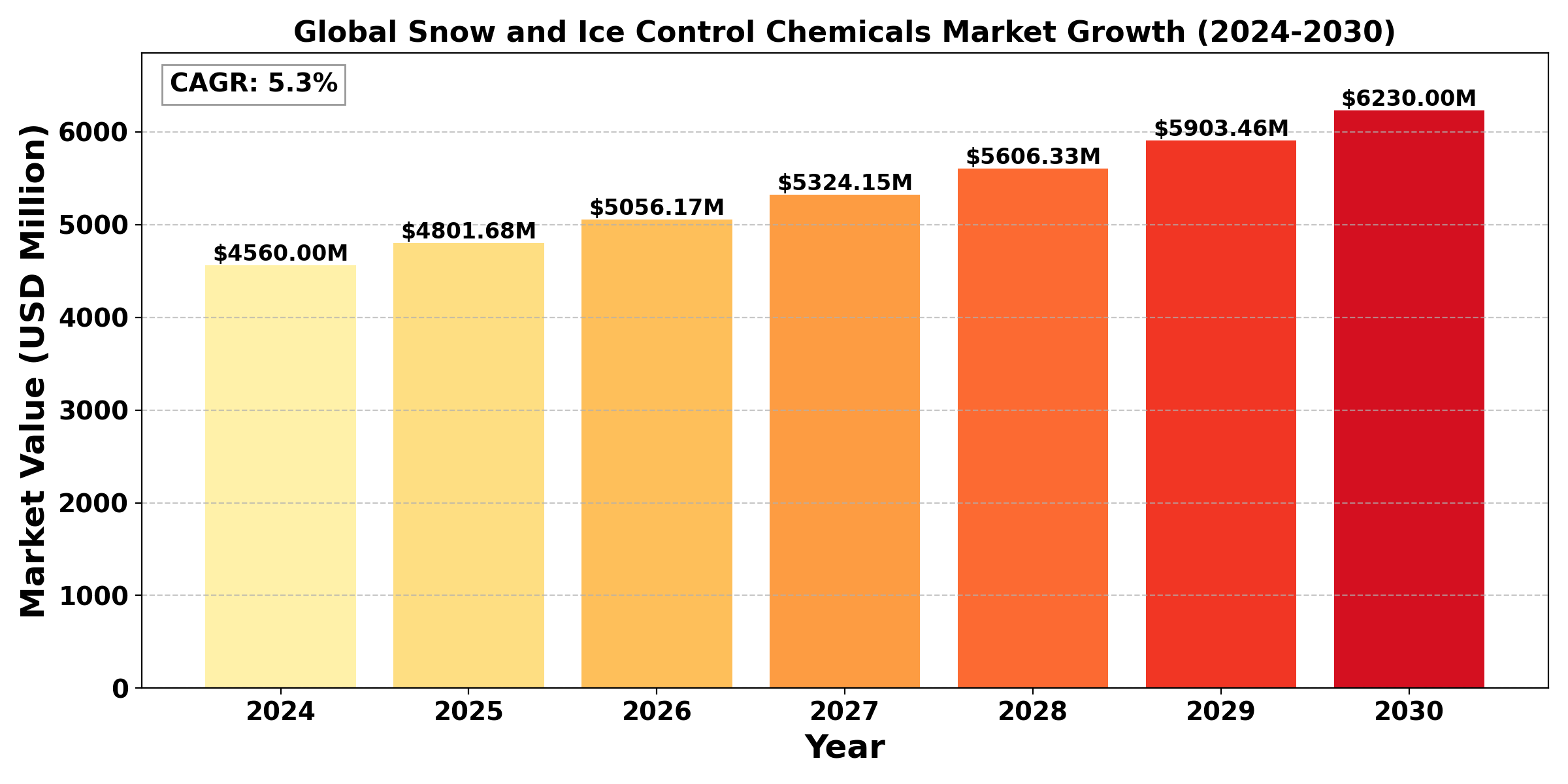TOP CATEGORY: Chemicals & Materials | Life Sciences | Banking & Finance | ICT Media
The "Global Snow and Ice Control Chemicals Market" size was valued at US$ 4.56 billion in 2024 and is projected to reach US$ 6.23 billion by 2030, at a CAGR of 5.3% during the forecast period 2024-2030.
The "United States Snow and Ice Control Chemicals Market" size was valued at US$ 1.23 billion in 2024 and is projected to reach US$ 1.65 billion by 2030, at a CAGR of 5.0% during the forecast period 2024-2030.
Snow and Ice Control Chemicals refer to specialized compounds used to manage and mitigate the accumulation of snow and ice on roadways, walkways, and other surfaces. These chemicals are designed to either prevent the formation of ice (anti-icing) or to break down and melt existing snow and ice (de-icing). Commonly used substances include salt-based products like sodium chloride, calcium chloride, magnesium chloride, as well as non-chloride alternatives such as potassium acetate and urea. These chemicals are critical for maintaining safety and accessibility during winter conditions.
The global market is growing steadily, driven by winter maintenance needs and infrastructure safety. In 2023, consumption reached 35 million metric tons globally, with municipal sector accounting for 65% of demand. The market saw a 30% increase in environmentally friendly product adoption in 2023. Rock salt dominates with a 70% market share, while liquid deicers are growing at 8% annually. North America leads with a 45% market share, while Europe is the fastest-growing region at 6.0% CAGR. The industry is focusing on developing eco-friendly alternatives, with a 35% growth in R&D investments for environmental protection.

Report Overview
Snow and Ice Control Chemicals refer to various chemicals and de-icing agents used to prevent ice formation and remove snow from roads, sidewalks, and other surfaces during winter.
Snow and Ice Control Chemicals Market provides a deep insight into the global Snow and Ice Control Chemicals market covering all its essential aspects. This ranges from a macro overview of the market to micro details of the market size, competitive landscape, development trend, niche market, key market drivers and challenges, SWOT analysis, value chain analysis, etc.
The analysis helps the reader to shape the competition within the industries and strategies for the competitive environment to enhance the potential profit. Furthermore, it provides a simple framework for evaluating and accessing the position of the business organization. The report structure also focuses on the competitive landscape of the Global Snow and Ice Control Chemicals Market, Snow and Ice Control Chemicals Market introduces in detail the market share, market performance, product situation, operation situation, etc. of the main players, which helps the readers in the industry to identify the main competitors and deeply understand the competition pattern of the market.
In a word, Snow and Ice Control Chemicals Market is a must-read for industry players, investors, researchers, consultants, business strategists, and all those who have any kind of stake or are planning to foray into the Snow and Ice Control Chemicals market in any manner.
Global Snow and Ice Control Chemicals Market: Market Segmentation Analysis
The research report includes specific segments by region (country), manufacturers, Type, and Application. Market segmentation creates subsets of a market based on product type, end-user or application, Geographic, and other factors. By understanding the market segments, the decision-maker can leverage this targeting in the product, sales, and marketing strategies. Market segments can power your product development cycles by informing how you create product offerings for different segments.
Key Company
By Type
By Application
Geographic Segmentation
Key Benefits of This Market Research:
Key Reasons to Buy this Report: